August 14, 2024
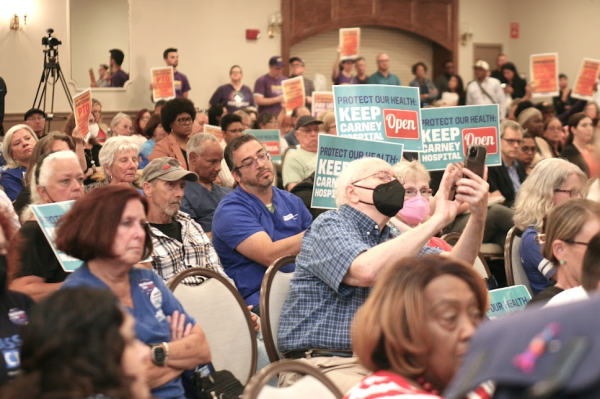
Hundreds attended the Tuesday hearing in Florian Hall, calling for the Carney Hospital to stay open and for workers to get their paid time off reimbursed. Seth Daniel photo
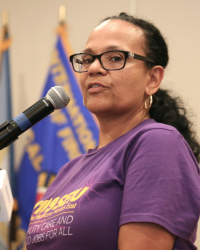
An overflow crowd of 500-plus people packed Florian Hall on Tuesday night for a hearing on the proposed closure of Carney Hospital. The public meeting, sponsored by the state’s Department of Public Health (DPH), is a required step before the hospital’s planned shutdown on Aug. 31 – an outcome that many speakers who attended pledged to block, if possible, although Dr. Robbie Goldstein, the commissioner of the DPH, was not one of them.
In his opening remarks, Goldstein told the audience that while the Steward Health Care’s plan to close Carney and Nashoba Valley Medical Center in Ayer, was “unfair,” it was beyond his powers to intervene.
“The DPH does not have the ability or the authority to prevent or deny closures,” he said. “We cannot force a hospital to stay open, especially if doing so might risk quality of care and the safety of patients.”
Dr. Octavio Diaz, the sole representative from Steward Health Care who spoke at the hearing, called it “deeply regrettable, but also unavoidable” that Carney must close, citing an “exhaustive” process to find a potential buyer that, he claimed, “did not yield positive results.” Diaz said Carney’s medical staff and administrators were now focused on discharging patients “safely and appropriately.”
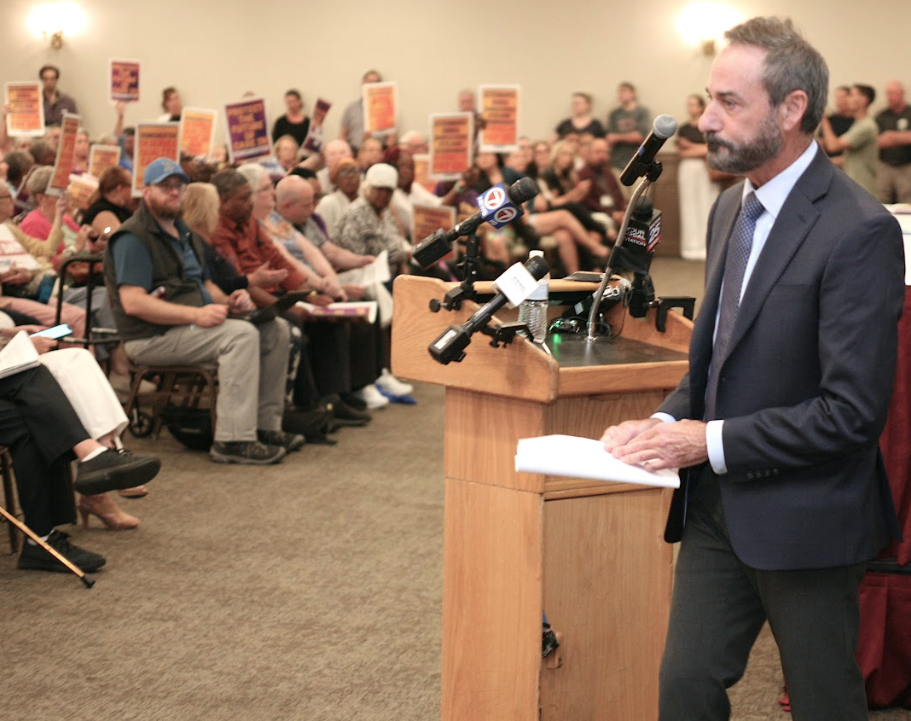
Above: Dr. Octavio Diaz, president of Steward Health North Region, left the podium to jeers from some. Seth Daniel photo
“This is the only way we can move forward to provide a margin of safety,” said Diaz, who worked as an emergency room physician at Carney from 2001-2003. As he stepped away from the Florian Hall microphone, he was heckled by a few voices with calls of “Judas” and “Shame on Steward.”
The city of Boston’s top public health official, Dr. Bisola Ojikutu, carried a similar tone of caution and resignation in her role representing Mayor Wu at the hearing. Ojikutu acknowledged that the Carney’s closure would “clearly deepen the health inequities that already exist” in the city.
But, she added, “We cannot stop the closure of Carney Hospital.” She also said the Wu administration would not seek to declare a public health emergency as urged by a 12-0 vote of the Boston City Council last week.
Ojikutu closed by reminding the audience that the mayor has pledged to block any redevelopment of the Carney property for “anything other than the provision of health care.”
City Councillor Ed Flynn drew a standing ovation when he took the mic and immediately challenged both Goldstein and Ojikutu’s positions.
“I don’t accept the premise that the City of Boston and the Commonwealth of Massachusetts can’t keep this hospital open,” said Flynn, who worked in Carney’s security department for four years prior to his political career. “We have the ability to keep it open if we have the moral courage to keep it open. This is about public safety and, my friends, it’s also a civil rights issue.”
District 3 City Councillor John Fitzgerald pledged to keep fighting to prevent a closure, saying, “It’s impossible for me to accept that there’s nothing we can do and our hands are tied. I can't get there on a personal level. I know there’s a way to keep this hospital open."
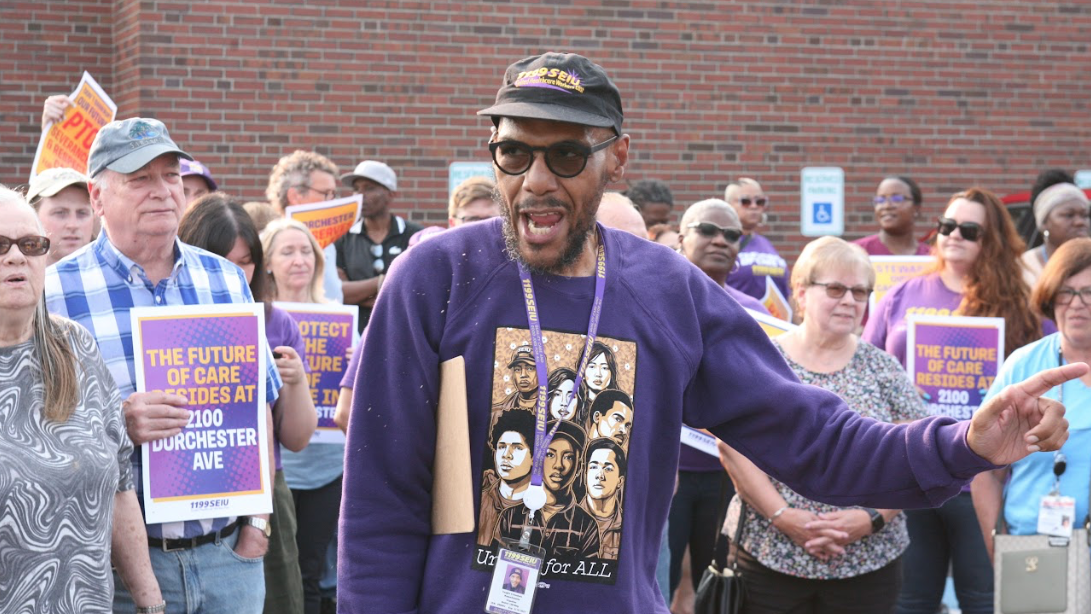
Vaughn Goodwin, of SEIU 1199, rallied workers and Carney employees outside Florian Hall on Tuesday evening ahead of the Department of Public Health hospital closure hearing, eventually marching into the hall with chants and songs. Seth Daniel photo
State Rep. Dan Hunt told the audience he “stands with the community” and is “committed to working with my colleagues" to keep elements of the hospital ¬– like the emergency department and psychiatric units – open under new management. Hunt called the Steward collapse the result of “corporate raiding by really bad people and it’s shameful.”
Councillor Julia Mejia challenged DPH for not forcing Steward to adhere to state regulations that require a minimum 120 days’ notice of a hospital closure.
"Why, DPH, have you accepted this expedited closure process?” Mejia asked. “How does that protect the health and safety of Carney patients?”
Mejia said that there was a “broken trust” in Dorchester and Mattapan because of the state’s failure to fight for Carney to stay open. She called it “hospital gentrification, adding that “we are creating health deserts in the city of Boston.”
Maryanne Murphy, who has worked in the Radiology department at Carney for 40 years, implored state officials to reject Steward’s closure. “What will you do when this place closes?” she asked. “Our hospital saves lives, our employees save lives.”
Numerous speakers echoed this theme of heightened health risks that will accompany a Carney closure, particularly the loss of the emergency department.
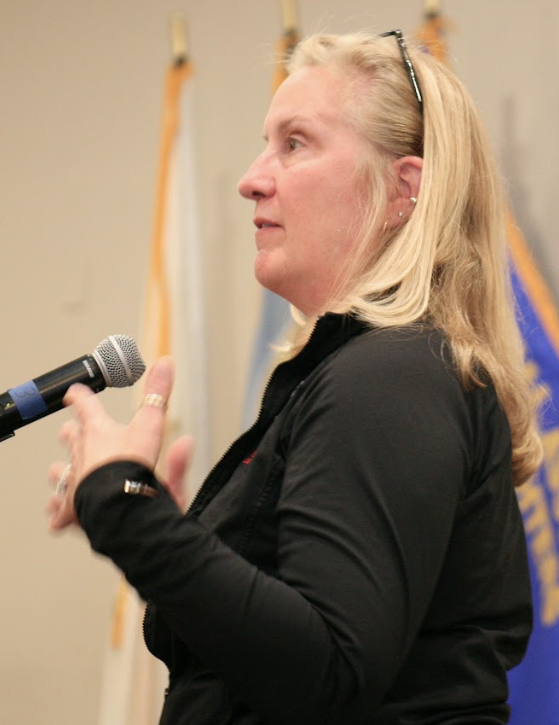
Mary Ann Rockett, (above) an ER nurse at Carney, noted that the cascading impacts of closing the ED would impact caregivers across the region, and make wait times for care that much worse.
“Our poor EMS crews,” she said. “This is going to create an even longer wait time in people’s homes or wherever they’re calling 911 from. It’s just going to be dangerous.”
Dana Simon, who works for the Massachusetts Nurses Association (MNA), leveled a devastating critique at the DPH and other state leaders who, he says, have repeatedly failed to enforce their own rules and have overseen the closures of several community hospitals.
“Elected officials – the governor, the attorney general, they all say nothing at all,” said Simon. “What they can do is save this hospital.”
The MNA’s president, Katie Murphy, who represents 240 nurses at Carney, blasted Healey and her administration for allowing the closure to proceed.
“There is no moral or medical justification for this closure,” she said, while noting that she and her members were deeply disappointed that the governor, the speaker of the House, and the Senate president aren’t here." The only viable contingency plan is to not close Carney Hospital,” she said.
Bill Walczak, a former Carney president who has worked in Dorchester’s health care system for 50 years, said 200,000 people in Boston and surrounding communities – including "populations with among the poorest health outcomes” – would be impacted by the closure.
“This is health care redlining,” said Walczak, who called the state’s role in expediting the Carney’s closure “malpractice on these communities.”
As the audience cheered, he asked, “Since when does the leadership of the Commonwealth of Massachusetts allow a bankruptcy judge in Houston, Texas, to determine how health care is provided in our state? I have a feeling that if the hospital that was the subject of this hearing was called Newton-Wellesley instead of Carney, this closing hearing would not be happening.”
State Sen. Nick Collins said it would be unsafe to close Carney, noting how even in recent months amid widespread reports of a crisis with Steward’s facilities, Carney’s emergency department has stayed busy, on pace with the 30,000 patient visits it sees annually.
“Closing this hospital in this time frame is against the law,” said Collins. “The commonwealth will be paying for this one way or another.”
Collins urged the governor and mayor to declare a public health emergency and consider, at least for a time, incorporating Carney into the state’s own Health and Human Services budget.
“We already do that in four places across the state. The notion is that the market has spoken, but the Commonwealth of Massachusetts is the market. The state and the city have the power and the money to keep Carney Hospital open.”
The DPH will host a phone conference hearing on Wednesday, Aug. 14 at 6 p.m. Members of the public can give testimony by calling 888-917-8055. Passcode is 4153805.
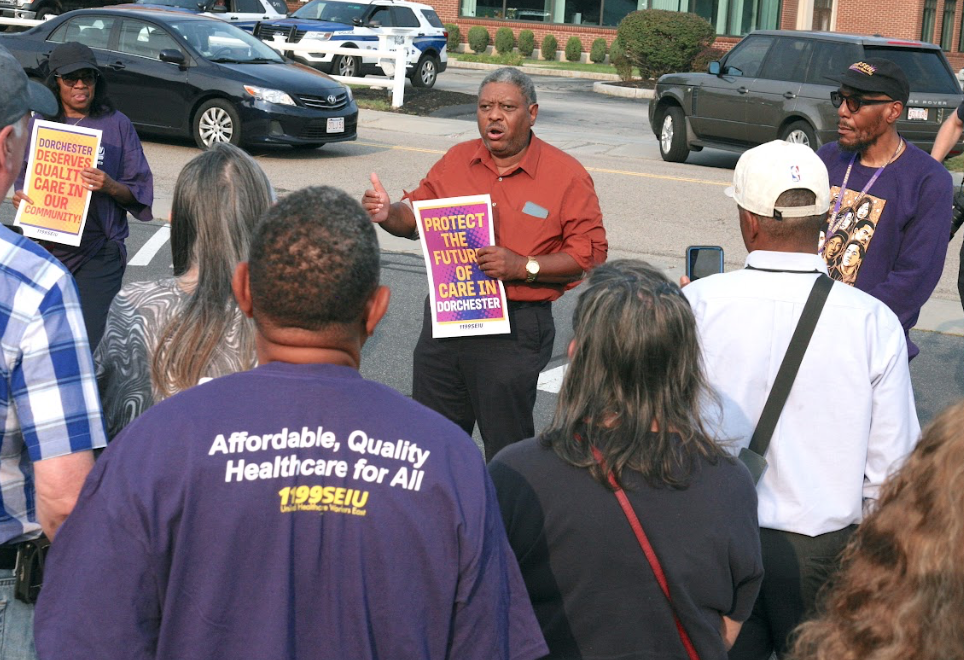
Karl Odom, an SEIU 1199 member and Carney employee, spoke about the union’s demand to get paid time off. Seth Daniel photo
Villages:



